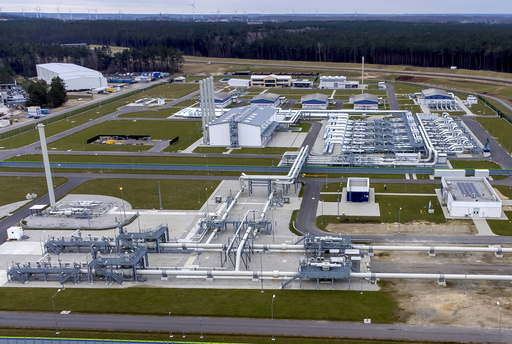COPENHAGEN, Denmark (AP) — Denmark on Monday joined Sweden in closing its investigation into the 2022 explosions that damaged the Nord Stream gas pipelines, with authorities saying they concluded there was deliberate sabotage but “not the sufficient grounds” to pursue a criminal case.
Danish authorities said the probe “has been both complex and comprehensive.” Copenhagen police, which carried out the investigation jointly with the Danish security service, said they were not able to provide further comments.
The underwater detonations on the Nord Stream gas pipelines, which were built to carry Russian natural gas to Germany, occurred in international waters but within Swedish and Danish economic zones. Sweden earlier said that a state actor was the most likely culprit.
Denmark’s investigation was one of three into the explosions.
Sweden ended its probe on Feb. 7 on the grounds that it has no jurisdiction. It said the investigation’s primary purpose was to establish whether Sweden or its citizens somehow were involved. Swedish officials also said they handed over to Germany “material that can be used as evidence in the German investigation.”
Denmark’s decision to close the investigation was expected, Kenneth Øhlenschlæger Buhl of the Royal Danish Defense College told The Associated Press.
“The Swedes said they had a fairly good idea of who was behind it but have no jurisdiction over those they wanted to talk to,” Øhlenschlæger Buhl said. The Danes are saying “the same, just slightly different words.”
“I believe that the Germans cannot reach any other conclusion,” he said. “They may open the lid a little more, but not much.”
The German federal prosecutor’s office said Monday that its investigation continues and that it won’t provide more information.
The source of the explosions has been a major international mystery.
The blasts happened as Europe attempted to wean itself off Russian energy sources following the Kremlin’s full-scale invasion of Ukraine, and contributed to tensions that followed the start of the war.
The undersea explosions ruptured the Nord Stream 1 pipeline, which was Russia’s main natural gas supply route to Germany until Russia cut off supplies at the end of August 2022.
They also damaged the Nord Stream 2 pipeline, which never entered service because Germany suspended its certification process shortly before Russia invaded Ukraine in February of that year.
The explosions at the pipelines took place about 80 meters (260 feet) underwater on the ocean floor in the Baltic Sea. Seismic measurements indicated that the explosions occurred shortly before the leaks were discovered.
Months after the detonations, there is no accepted explanation. Russia has accused the U.S. of staging the explosions, a charge Washington denies.
In Moscow, Kremlin spokesman Dmitry Peskov said that “the situation is close to absurd.”
“On the one hand, there was a deliberate act of sabotage and on the other hand there has been no progress” in the investigation. “The situation is so obvious that one can only express absolute astonishment,” he said.
The pipelines were long a target of criticism by the U.S. and some of its allies, who warned that they posed a risk to Europe’s energy security by increasing dependence on Russian gas.
In March 2023, German media reported that a pro-Ukraine group was involved in the sabotage using a vessel and setting off from the German port of Rostock. Ukraine rejected suggestions it might have ordered the attack and German officials voiced caution over the accusation.
Swedish prosecutors earlier hinted that the identity of the perpetrator was likely to remain unclear.
Beyond their geopolitical impact, the Nord Stream pipeline leaks were a huge environmental disaster with local wildlife affected and huge volumes of methane discharged into the Baltic Sea in what analysts believe could be the single largest release of methane due to human activity.
___
Associated Press writer Geir Moulsen in Berlin contributed to this report.
This website uses cookies so that we can provide you with the best user experience possible. Cookie information is stored in your browser and performs functions such as recognising you when you return to our website and helping our team to understand which sections of the website you find most interesting and useful.
